

Bryan Bruce - Knowledge is Power. Bryan Bruce is an award winning documentary maker, and best selling author.
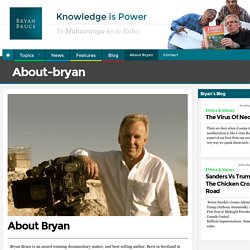
Born in Scotland in 1948, his family emigrated to New Zealand in 1956. He grew up in Christchurch and attended the University of Canterbury where he graduated with an M.A. in Sociology and Philosophy and Christchurch Teacher’s College where he earned a Diploma in Teaching. He was a professional musician for over 25 years before eventually taking up a career in television in 1985. Personal learning environments. Finding your way around the course website This OERu course is a micro Open Online Course (mOOC) where you will create your own personal learning environment (PLE).
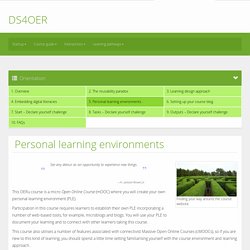
Participation in this course requires learners to establish their own PLE incorporating a number of web-based tools, for example, microblogs and blogs.
FYI - Make and browse Official Information Act (OIA) requests. FYI - Make and browse Official Information Act (OIA) requests. Completing the digital skills challenges. Overview of digital skills learning challenges Challenge your digital skills This course incorporates a number of digital skills challenges which are designed to produce component outputs you will need for the learning pathways you are developing for your course while improving your repertoire of digital skills for cooperative OER development.
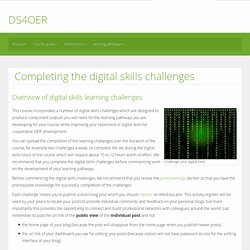
You can spread the completion of the learning challenges over the duration of the course, for example two challenges a week, or complete the set during the digital skills block of the course which will require about 10 to 12 hours worth of effort. We recommend that you complete the digital skills challenges before commencing work on the development of your learning pathways. Before commencing the digital skills challenges, we recommend that you review the preknowledge section so that you have the prerequisite knowledge for successful completion of the challenges. Learning Approaches. This page is part of our series on ‘learning’ for personal and professional development.
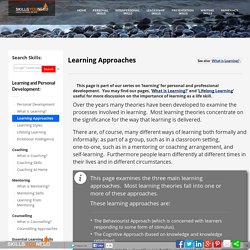
You may find our pages, ‘What is Learning?’ And ‘Lifelong Learning’ useful for more discussion on the importance of learning as a life skill. Over the years many theories have been developed to examine the processes involved in learning. Most learning theories concentrate on the significance for the way that learning is delivered. Teaching adults posters - Ako Aotearoa. Being exposed to core principles about learning can help adult learners engage better within their learning context.
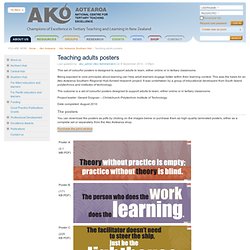
This was the basis for an Ako Aotearoa Southern Regional Hub-funded research project. It was undertaken by a group of educational developers from South Island polytechnics and institutes of technology. The outcome is a set of colourful posters designed to support adults to learn, either online or in tertiary classrooms. Homepage. Jswebdesign.co.uk/articles/ETp54_Stanford_article.pdf. EDUCERI. EDUCERI › Centre for Educational Research and Innovation (CERI) - New Millennium Learners Bookmark this page: www.oecd.org/edu/nml Welcome to the New Millennium Learners (NML) pages!
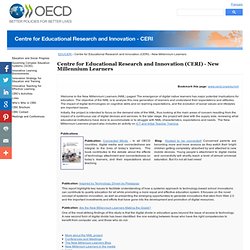
The emergence of digital native learners has major potential implications for education. The objective of the NML is to analyse this new generation of learners and understand their expectations and attitudes. The impact of digital technologies on cognitive skills and on learning expectations, and the evolution of social values and lifestyles are important issues. Initially, the project is intended to focus on the demand side of the NML, thus looking at the main areas of concern resulting from the impact of a continuous use of digital devices and services. Publications.
AJET 24(2) Elgort, Smith and Toland (2008) - is wiki an effective platform for group course work? Is wiki an effective platform for group course work?

Irina Elgort, Alastair G Smith and Janet TolandVictoria University of Wellington This study reports on students' and lecturers' perceptions of using wikis as a platform for conducting assessed group projects in two postgraduate Master's level university courses. The results highlight the fact that student attitudes to group work, in general, are mixed, and that the use of wikis per se is not enough to improve these attitudes.
On the positive side, students found wikis useful for arranging information and sharing knowledge, while instructors thought wikis made managing and marking group work easier and more effective. Other issues related to using wikis as a collaborative learning tool in higher education are also considered. Introduction. The Nth Degree. Www.jisc.ac.uk/media/documents/programmes/elearning/digiemerge/Emergingpracticeaccessible.pdf. Www.jisc.ac.uk/media/documents/publications/effectivepracticedigitalage.pdf. Kids can't use computers... and this is why it should worry you - Coding 2 Learn. TL;DR?
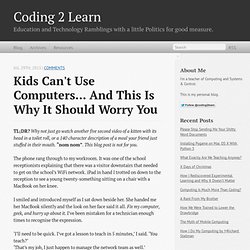
Why not just go watch another five second video of a kitten with its head in a toilet roll, or a 140 character description of a meal your friend just stuffed in their mouth. “nom nom”. This blog post is not for you. The phone rang through to my workroom. It was one of the school receptionists explaining that there was a visitor downstairs that needed to get on the school’s WiFi network. iPad in hand I trotted on down to the reception to see a young twenty-something sitting on a chair with a MacBook on her knee. I smiled and introduced myself as I sat down beside her. ‘I’ll need to be quick. MOOCs Directory.
Knowledge resources. Comprehensive resources have been developed to address common knowledge needs about e-Learning.
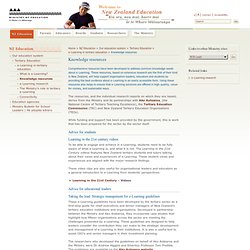
These resources, based on extensive research are the first of their kind in New Zealand, will help support organisation leaders, educators and students by providing the best evidence about e-Learning in an easily accessible form. Using these resources also helps to ensure that e-Learning solutions are offered in high-quality, value-for-money, and sustainable ways. The resources, and the individual research reports on which they are based, derive from the Ministry and its partnerships with Ako Aotearoa, (the National Centre of Tertiary Teaching Excellence), the Tertiary Education Commission (TEC) and New Zealand Tertiary Education Organisations (TEOs).
While funding and support has been provided by the government, this is work that has been prepared for the sector by the sector itself. Www.educate.ece.govt.nz/sitecore/content/minedu/home/educationSectors/TertiaryEducation/PublicationsAndResources/~/media/MinEdu/Files/EducationSectors/TertiaryEducation/NZCERFinalReport.pdf. 10 principles for designing engaging team tasks (narrated presentation) 6 core principles, virtually!
This post is the first in a series of three, co-created with Val Uccellani (Global Learning Partners).
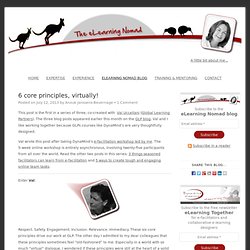
The three blog posts appeared earlier this month on the GLP blog. Val and I like working together because GLPs courses like DynaMind’s are very thoughtfully designed. Val wrote this post after taking DynaMind’s e-facilitation workshop led by me. The 5-week online workshop is entirely asynchronous, involving twenty-five participants from all over the world. Read the other two posts in this series: 3 things seasoned facilitators can learn from e-facilitation and 5 ways to create tough and engaging online team tasks. Enter Val: Respect. To help me examine my own question, I took a look at the extent to which these core principles were operating during my own experience in DynaMind’s recent e-facilitation course. Connectivism. Kdasilva. Enabling e-Learning - enabling eLearning. The Flipped Classroom: Turning the Traditional Classroom on its Head.
Supporting future-oriented learning and teaching - a New Zealand perspective. Executive Summary It is widely argued that current educational systems, structures and practices are not sufficient to address and support learning needs for all students in the 21st century. Changes are needed, but what kinds of change, and for what reasons? This research project draws together findings from new data and more than 10 years of research on current practice and futures-thinking in education.
It aims to support the Ministry of Education’s programme of work to develop a vision of what future-oriented education could look like for New Zealand learners. The work is guided by three high-level research questions:1. Online Student Experience.
A MindShift Makeover for Tech Integration. What’s the Difference Between “Using Technology” and “Technology Integration”? Activities. The 21st Century Learning and Teaching Skills You should not Miss. Digital media and internet are transforming the way our kids socialize and play; they are even changing the way they learn and participate civically. Many believe that this shift could possibly transform teaching and learning broadening, thus, the focus of literacy to include the digital element. Technology is not only revolutionizing education but it is also reconceptualizing the way this education is delivered. Here is how this reconceptualization process is taking place : Learning environments in the 20th century : Learning in the 20th century was basically taking place in a poor environment whose major players were : school, teachers, and parents.
Innovating_Pedagogy_report_July_2012.pdf.